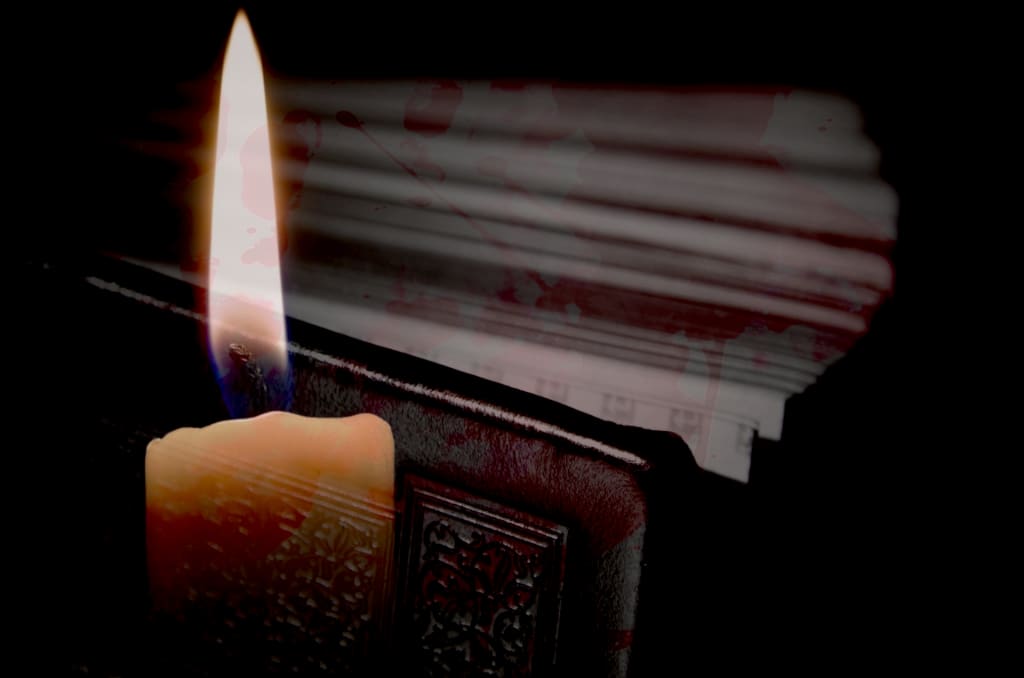
“Hand it over, Morris!”
The small, leather-bound notebook had been snatched securely into the hands of the menacing figure in gentleman’s attire. So securely, in fact, that it was scarcely even visible. It had happened in a flash. Morris had stormed into the man’s office and visibly startled him by flinging the door open so hard that it crashed into the wall. By the time the man’s surprise had finally subsided and he could take stock of the situation, his most prized possession was in Morris’ unforgiving grasp.
“What’s the matter, Eugene, haven’t the grit to retrieve it yourself?” taunted Morris, while he tucked the book into the interior breast pocket of his overcoat. His lips formed a thin, devilish smile, head half-cocked in amusement.
Eugene stood abruptly at his desk, causing his chair to slide back with a screech. “Hand it over, or I’ll take my book and shred that coat to rags, you snake!” His voice carried a sternness with it which surprised even himself.
Morris’ eyes widened a bit, his smile fading just a tinge. He skipped a beat and took a moment to fasten the buttons of his coat before speaking again. “My, my, my, you do surprise, don’t you, my meek little chum. When did you get the gumption to challenge me in matters of business?” asked Morris, with a tone of intrigue.
“Business is business, Morris, but that book…” Eugene trailed off, having noticed the finger he had pointed towards Morris’ pocket was shaking. He regained his composure and spoke again. "That book is personal. You don’t know the risk you’re taking even having that in hand, old man.” He felt a single bead of sweat slowly roll down his brow and along his cheek.
At this, Morris noticed the full severity of Eugene’s exacerbated state and it emboldened him. “You do look frightful, dear Eugene,” Morris spouted with a scoff. “Out with it, then. I always see you carrying this little black book.” He tapped the lump in his overcoat. “You’re always hunched over it. So, tell me, what makes it so important and could it, by chance, contain anything worth the $20,000 in gambling losses you owe me?”
Eugene was visibly deflated by the mention of his debts. His eyes darted from side to side, while he searched for words that could dissuade Morris from keeping his notebook. He opened his mouth and tried to speak as truthfully, yet carefully, as he could. “I can only get you the money if I have my book, Morris.” Eugene’s defeat came through in his voice. He paused to wet his lips before adding, “Please, just hand it over.”
“Gladly, my boy, gladly!” Morris answered, projecting his voice loudly with an exaggerated smile. “It’s only, I shall need a rather generous down payment in order to return it to you.” Morris gave a sadistic, self-indulgent chuckle and averted his attention from Eugene and onto his gloves. He pulled them tighter, left then right, clenching each with a fist, audibly wringing the leather. “Unless, of course, you’d also like to pay a generous holding fee for the book.” He raised one eyebrow and slowly directed his gaze back to Eugene’s eyes, which were wide with desperation.
“I… I don’t have that much,” Eugene stammered, “just a couple thousand.” He retrieved his keys from his pocket and immediately put them to work on the bottom drawer of his desk. He pulled out a clip of folded bills. “Please, Morris,” he pleaded, “I need my book to get the rest.” Eugene extended his arm, offering all his cash to Morris, whose expression was uncaring as ever.
A long sigh escaped Morris’ lips as he snatched the bills, almost as greedily as he had taken the book. “I shall have to hold on to your book for now, until you can make up the remainder of your debts.” Morris tucked the money into his back pocket, turned away to leave, but paused for a moment. He turned his head to the side and spoke again. “Consider this first payment a holding fee for the pocket space this book is taking up, what could be holding more money.” With that, Morris stormed out, leaving the door wide open.
Likewise, Eugene’s mouth was left agape in utter disbelief. He collapsed into his chair and tried to catch his breath. “It’s okay,” he muttered to himself, “it’s okay old chap, get it together now. Just wait for the right moment.” Eugene reached into the open drawer of his desk and pulled out a loose bottle of scotch. “Yes…” he assured himself, as he removed the cork from the bottle. “That’s what I’ll do.” He took a big gulp and swallowed hard. “That’s what I’ll do…”

That evening, Morris sat at his desk by candlelight, swirling around his third glass of bourbon. He sipped it slowly, eyes red and glazed, as he stared down at the little black notebook in front of him. With his free hand, Morris lightly ran his fingers over the cover, appreciating the craftsmanship with which it was made. He took another sip of his drink, sat it down, and picked up the book instead. He turned it over in his hands and began to look more closely at its finer details.
Morris noted the gilding on the pages, appreciated the luster and texture of the well-treated leather which bound it, and took a moment to caress the silk bookmark which was sewn into the spine. Everything about the book was absolutely exquisite, a handmade masterpiece to be sure, yet he could find no maker’s mark. He cracked open the front, looking for something that would reveal its origin, but it was completely bare. The edge of the pages brushed the palm of his hand when he turned it over. Their texture told him the paper was of the highest quality. After peering into the back of the book, still, he discovered no defining feature.
He found it odd that the book’s maker did not take credit for their work. He wondered if Eugene had it commissioned since, surely, he could not have made it himself. Morris chuckled at the thought and sipped his bourbon again. Then, his focus was entirely on the notebook. He opened it at the bookmark and, using both hands, placed it flat on his desk. With the marker still in place, he inspected the interior.
The right page was blank, but the left had a single sentence on every gilded line. Morris flipped through the front pages and saw that each line was diligently filled. He turned back to the most recent entries and skimmed the page. It was mostly requests for cash, though some entries were different and, Morris thought, quite odd. One line read ‘Can I have $500?,’ the following line asked ‘Can today be a good day?’ another said ‘Please send $150,’ and so on. The last two lines that were written on the page were identical: ‘Urgently need $1,000.’ At this, he raised an eyebrow and tried to imagine how such notes could possibly pay Eugene’s debts.
Morris finished his drink and stared into the flickering flame of the candle on his desk. He wondered if Eugene was trading the book with someone, or placing bets on their behalf. Suddenly, he thought to count the money he had been given earlier. He reached into his back pocket, retrieved the bills, and began counting each crisp hundred-dollar bill. “One, two, three, four, five…” he muttered to himself. “Eighteen, nineteen, twenty,” he finished. The sum had reached $2,000 and, at that, Morris felt a shiver eerily make its way up his spine. Immediately, his eyes darted to the last two identical lines that were written on the page. ‘Urgently need $1,000.’ He tossed aside the bills, leaving them in a pile on his desk.
First, Morris’ attention was on the ink and quill, just beside his empty bourbon glass. Then, the ink was open, the quill was out and in the ink, and he barely took the time to let the instrument drip before he had put it to paper and written out ‘Give me my $20,000.’ After dotting the period at the end of the sentence, he swiftly dropped his quill into the ink and sat back in his chair, quite pleased with himself. “That ought to take care of that poor, miserable sap,” he said aloud, “I’d like to see his wealthy backer’s face when they take a look at that sum,” he laughed to himself with a snort.
Morris reached out and slammed the notebook closed. Just as he did this, something stirred in his periphery. Instinctively, he turned his head. He had not seen who, or what, had left it there, nor had he even heard a sound, but, sitting neatly on the edge of his desk, stacked against the wall, was what appeared to be $20,000. Morris’ heart nearly leapt from his chest, but he had no time to dwell on the fear, for he had already begun to feel a stabbing sensation. It was subtle at first, like a limb with poor circulation, but the pain began to build until it formed a swarm of thousands of pins and needles on the entire surface of his skin.
He felt a particularly firm prick in his cheek and instinctively touched a hand to his face. One look at his fingers told him that he was bleeding. The stabbing of the invisible needles intensified and Morris could not help but cry out in pain. He looked at his arms, which were covered in tiny droplets of blood that began to ooze more and more as he watched. His pain turned to agony and he gave out a curdling scream, accompanied by a convulsion that knocked him onto the floor. Just then, he heard the creaking of the door and the footsteps of someone entering the room.
“Do you think you’re the first person to take my book, Morris?” It was Eugene. Morris could not see him at first, but finally Eugene came to stand directly over him. He spoke again, “Your kind is always too greedy once they know what it can do.” Morris looked up, helplessly, writhing in pain and bleeding from every pore. Eugene stepped over him, retrieved the book off the desk, and continued to speak indifferently.
“I keep this book to protect people like you from themselves.” Eugene appeared concerned with the well-being of the notebook. He inspected every inch of the cover as he spoke. “Something this book taught me a long time ago is that nothing is free, my good man.” He removed a handkerchief from his pocket and began to polish the cover as he continued. “You see, this book is a resource…”
Morris was barely conscious. His skin was entirely covered in blood and he gasped for air from the floor, still helplessly watching Eugene dote over the book like a long-lost lover. Eugene finished polishing it, placed the handkerchief back into his pocket, looked down at Morris once more, and went on.
“And, what most men don’t understand about resources is that they’re finite, making their protection all the more important.” Eugene finally tucked the book safely into his coat pocket and gazed back down at Morris, whose breath was shallow as he looked up at Eugene in horror. “To benefit from a resource, one must also conserve it. Don’t take everything at once, like a thoughtless fool; parse it out over time and allow it to replenish. That’s why I never ask the book for large sums of cash.”
Eugene crouched down, coming face to face with Morris, whose breath was so faint that it could stop at any moment. As Morris’ vision began to fade, he heard Eugene say one last thing. “If only more of us could recognize our errors, before we do irreparable damage.”
About the Creator
James S. Bray
Writer of fiction and non-fiction alike 🖖
Check out my book: 'The New Frontiers of Lucid Dreaming' on Amazon!
Connect with me elsewhere: Linktree






Comments
There are no comments for this story
Be the first to respond and start the conversation.